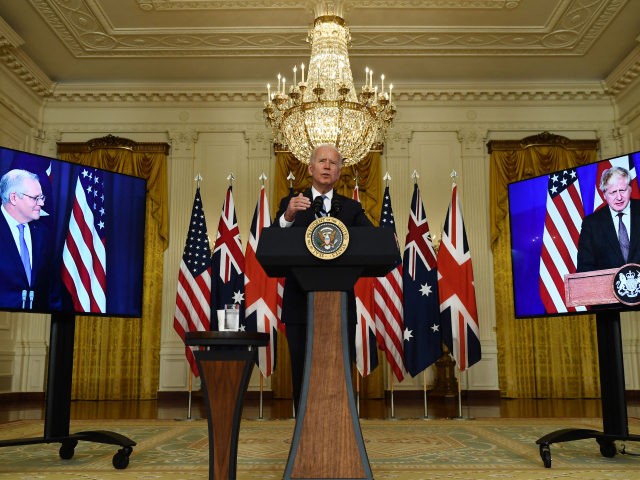France has reacted bitterly to the double blow of not only their contract with Australia for submarines having been cancelled, but Europe being “excluded” from the new defence pact between the UK, the USA, and Australia to counter communist Chinese aggression in the Indo-Pacific, claiming it heightened the need for “European strategic autonomy” — i.e., an EU army.
On Wednesday night British time, U.S. President Joe Biden, UK Prime Minister Boris Johnson, and Australian Prime Minister Scott Morrison held a joint conference via videolink announcing a trilateral defence and security partnership dubbed AUKUS, which will enhance technology-sharing and interoperability, including in areas such as artificial intelligence, cyber capabilities, and quantum technologies.
While not naming China specifically, the British government said in a statement that the partnership would “protect and defend our shared interests in the Indo-Pacific”.
AUKUS’s first initiative will be the collaboration on the development of nuclear-powered submarines for the Royal Australian Navy. Canberra informed Paris earlier on Wednesday that it would be dropping its AUS$90 billion (£47.63bn/U.S.$65.89bn) contract for 12 French-designed boats in favour of eight to be constructed with the new alliance.
“We will leverage expertise from the United States and the United Kingdom, building on the two countries’ submarine programmes to bring an Australian capability into service at the earliest achievable date,” the three Anglosphere leaders said last night.
In a statement from the French government released on Thursday, French Foreign Affairs Minister Jean-Yves le Drian called the decision to end the contract “contrary to the letter and spirit of the cooperation which prevailed between France and Australia”.
Mr le Drian was far less formal in his condemnation when speaking to French television station Franceinfo on Thursday morning, calling the decision “a stab in the back” and claiming that “trust was betrayed”, admitting that he was “angry and very bitter about this break up”, in comments reported by POLITICO.
EU Chief Von der Leyen Says Europe Must Build the ‘Political Will’ for an EU Army https://t.co/2O5WwX2rDn
— Breitbart London (@BreitbartLondon) September 16, 2021
“This is not over,” Mr le Drian continued. “We’re going to need clarifications. We have contracts. The Australians need to tell us how they’re getting out of it. We’re going to need explanation. We have an intergovernmental deal that we signed with great fanfare in 2019, with precise commitments, with clauses, how are they getting out of it? They’re going to have to tell us. So this is not the end of the story.”
Le Drian also complained that U.S. President Biden’s “American behaviour” was reminiscent of former President Donald Trump, calling the decision “brutal, unilateral, [and] unpredictable”.
While France’s upset may very well be genuine, as pointed out by military analyst Christian Le Miere the country has a sketchy past in honouring its own military commitments, pointing to some level of hypocrisy about France’s demands that its allies cleave to the letter of the law on alliances and agreements.
The French foreign minister in the official government statement also condemned the new trilateral — and notably Anglosphere — defence and security partnership for lacking a “European ally” — specifically a “partner like France”.
“The American decision, which leads to the exclusion of a European ally and partner like France from a crucial partnership with Australia at a time when we are facing unprecedented challenges in the Indo-Pacific region, be it over our values or respect for a multilateralism based on the rule of law, signals a lack of consistency which France can only notice and regret,” the statement said, continuing that the announcement “only heightens the need to raise loud and clear the issue of European strategic autonomy” — i.e., an EU army.
In 2018, France’s President Emmanuel Macron was keen to establish a “real European army” to “protect ourselves with respect to China, Russia and even the United States of America” — remarks which at the time then-President Donald Trump condemned as “very insulting”.
Watch: Joe Biden Forgets Who He’s Talking To — Calls Australian PM ‘That Fella Down Under’ https://t.co/jYa1HkpoWH
— Breitbart London (@BreitbartLondon) September 16, 2021
Recent support for progress on the EU army has also come from the bloc’s European Parliament with German MEP Manfred Weber calling for the “need to build European capacities, such as a European reaction force”, the comments coming in the wake of President Biden’s disastrous withdrawal from Afghanistan. The withdrawal also prompted EU Foreign Affair and Security Policy Commissioner Josep Barrell to call for “more European defence”.
This week President of the European Commission, the EU’s powerful executive branch, Ursula von der Leyen, said the bloc should move forward with the formation of a “European Defence Union”.
NATO’s chief Jens Stoltenberg, the former prime minister of non-EU nation Norway, warned last week that the European Union developing its own rapid reaction force could weaken the heavily American-backed defence union and could “divide Europe”.
“Any attempt to weaken the bond between North America and Europe will not only weaken Nato, it will divide Europe,” Mr Stoltenberg said.
EU Army: NATO Chief Warns EU Rapid Reaction Force Would ‘Divide Europe’ and Weaken American Alliance https://t.co/Ged09LOxi9
— Breitbart London (@BreitbartLondon) September 7, 2021

COMMENTS
Please let us know if you're having issues with commenting.